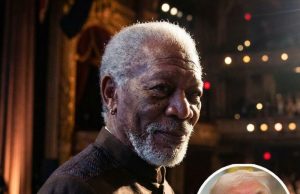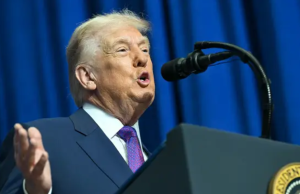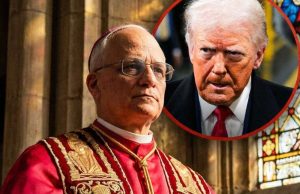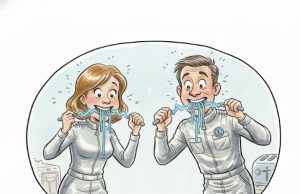
The afternoon Laura and her father, Ernesto, entered the pediatric clinic, Dr. Valeria Gómez immediately noticed something was off. Laura, a sixteen-year-old, walked with her shoulders slumped, avoiding eye contact with everyone. Her father, on the other hand, seemed tense, almost vigilant, as if he feared something might spiral out of control at any moment.
“Good afternoon, what brings you here?” the doctor asked, with a professional smile.
Ernesto answered before his daughter could even open her mouth.
“Stomach pains. For days now.”
Laura clasped her hands in her lap. She said nothing.
During the initial interview, the doctor asked routine questions: diet, sleep, menstrual cycles. Every time Valeria directed a question to Laura, Ernesto intervened, answering for her or placing a hand on her shoulder, a gesture that seemed more intimidating than reassuring.
The doctor, accustomed to noticing the small details that others overlooked, decided to order an abdominal ultrasound.
“Just to rule out any complications,” she said, though something in her intuition was beginning to alarm her.
When Laura lay down on the examination table, Ernesto tried to stay in the room, but Valeria politely insisted he wait outside.
“I’ll need space and to concentrate. Don’t worry, I’ll call you as soon as we’re finished.”
As soon as the door closed, Laura let out a shaky sigh.
“Does it hurt a lot?” the doctor asked as she applied the gel.
The girl shook her head, but her eyes filled with tears.
“No… it’s not that.”
The doctor moved the transducer across her abdomen, examining each area. Everything seemed normal, until she noticed something unexpected: a gestational sac. Laura was pregnant, probably about twelve weeks along.
The girl’s breathing quickened. Valeria lowered the transducer and sat beside her.
“Laura… I want you to know you’re safe here. I need you to tell me if you wanted this, if you’re okay with this pregnancy.”
The teenager burst into tears.
“I… I didn’t know. And I can’t say anything. He…” She covered her mouth with her hand. “I can’t.”
Valeria’s heart raced. Her mind ran through all the child protection protocols. They had to act carefully, but quickly.
“Laura, look at me,” she said gently. “Whatever’s happening, I can help you. No one has the right to hurt you.”
The door burst open. Ernesto poked his head in, looking impatient.
“Are you finished?”
Valeria sat up, hiding her concern behind a professional expression.
“I need to talk to you for a few minutes, Ernesto. Alone.”
Laura closed her eyes, as if the mere sound of her father’s voice was enough to shatter her completely.
The doctor understood that this was only the beginning… and that what she was about to discover could be far worse than she imagined.
The doctor led Ernesto to a small adjoining room, away from the examination table where Laura was trying to stifle her sobs. She closed the door carefully, without rushing. Her tone was firm, but measured.
“I found something on the ultrasound,” she began. “Laura is pregnant.”
For a moment, Ernesto showed no reaction whatsoever. No surprise, no worry, no anger. Just a slow blink.
“I see,” he replied, too calmly.
A chill ran through Valeria. That reaction wasn’t the natural one for a father who had just received such news.
“I need to ask your daughter some questions unsupervised,” she continued. “It’s a medical and legal requirement. And I have to notify social services. It’s protocol.”
Ernesto’s face hardened.
“There’s no need to involve anyone. I’ll take care of it.”
The tone was dangerous. Controlled, but threatening. Even so, Valeria wasn’t intimidated.
“It’s mandatory,” she repeated. “And I’ve already asked someone to come. I ask you to wait in reception.”
The man clenched his jaw, but finally left. The doctor waited a few seconds and returned to Laura.
The teenager was huddled on the examination table, breathing in short, shallow breaths.
“Laura,” Valeria said gently, “I need you to tell me the truth. Do you know who the father is?”
The girl took several seconds to answer. Finally, she shook her head.
“I don’t want any trouble… He says that if I talk, he’ll ruin everything. That he’ll leave us with nothing.”
“Him?” Are you referring to your father?
The silence was confirmation.
Valeria felt a mixture of indignation and deep sadness, but she kept her face calm.
“Laura, what you’re going through is extremely serious. You’re not alone. I’m going to protect you, okay?”
The teenager looked at her with desperate eyes.
“He never leaves me alone at home. He’s always watching me. And if I cry, he says it’s my fault. That I have to behave. That…” Her voice broke. “…that I should be grateful.”
Valeria made a decision.
“I’m going to call a social worker and the police. They’re going to help you. No child should have to go through this.”
Laura trembled.
“What if he gets angry? He… he can be very different when no one is around.”
“That will end today,” the doctor said without hesitation.
When the police arrived, Ernesto tried to leave the clinic, but he was stopped at reception. She protested, she shouted, she demanded to see her daughter, but the officers restrained him professionally. Valeria stayed by Laura’s side the entire time, holding her hand.
A social worker, Julia Rivera, arrived at the office.
“Laura, I’m going to be with you through this whole process,” she assured her. “You’re not going back to him.”
The girl completely broke down, crying on Julia’s shoulder. It was the first time in a long time that someone had told her she had a choice. That her voice mattered.
However, even though Ernesto had been arrested, Laura’s story was only just beginning. There were wounds deeper than physical ones, traumas that wouldn’t simply disappear with an arrest. Valeria knew this well: the hardest part was yet to come.
And for Laura, the whole truth had not yet been revealed.
After Ernesto’s arrest, Laura was taken to a temporary shelter while the investigation began. Julia, the social worker, stayed by her side, explaining each step clearly and patiently. Even so, the teenager felt lost, scared, and filled with guilt.
“You didn’t do anything wrong,” Julia repeated gently. “What happened is solely his responsibility.”
Even so, Laura was afraid to speak. Every word was a struggle, as if her father were still standing beside her, judging her. For the first few days, she barely ate, avoided conversation, and woke up startled at night.
Dr. Valeria, despite not being obligated to do so, visited her voluntarily.
“I wanted to make sure you’re okay,” she said as she entered the shelter’s common room.
Laura looked up and, for the first time, smiled weakly.
“Thank you… for not ignoring me.”
During that visit, Valeria explained the medical results: the pregnancy was advanced, but Laura could decide. She spoke to her about options, without pressure, with complete professional neutrality.
“Whatever you choose, we’ll be with you,” she assured her.
As the days passed, Laura began to open up. She recounted episodes she had kept silent for years: how her father controlled her movements, her clothes, her friendships; how he emotionally manipulated her until she felt invisible. But the most terrible part was revealed in an almost inaudible voice: the ab:u:se had begun long before she understood what it meant.
Julia sought specialized psychological help. The first session was difficult. Laura avoided eye contact, wrung her hands, and doubted every word.
“You have the right to feel afraid,” the psychologist told her, “but you also have the right to heal.”
Meanwhile, the police investigation progressed. They soon discovered that Ernesto had been reported years earlier for aggressive behavior toward Laura’s mother, who had d:ied when the girl was eleven. That story, usually told as a sudden tragedy, began to be questioned. The police saw signs that Ernesto had engaged in a much more dangerous actions than previously known.
The prosecution decided to charge him. The case became complex and emotionally devastating, but Laura was no longer alone.
A month later, during a meeting attended by Valeria, Julia, and the psychologist, Laura spoke with a firm voice for the first time.
“I don’t want to continue with the pregnancy,” she said. “I want to start over.”
No one pressured her. No one judged her. They simply listened.
After following the appropriate legal and medical procedures, Laura received the necessary care. It was a painful but also liberating period. In the following weeks, she began attending special classes at the shelter and gradually resumed activities that had previously been forbidden: reading novels, choosing her own clothes, walking alone in the garden.
One day, while talking with Valeria, the doctor told her something Laura would always remember:
“Your past doesn’t define your future. You decide who you want to be.”
And for the first time since entering that clinic, Laura believed it.
She knew the road ahead would be long, that the scars wouldn’t disappear immediately. But she also knew something more important: she had support, she had options, and above all, she had freedom.
Her story didn’t end there. But finally, after years of living in the shadow of fear, Laura began to write it herself.




















